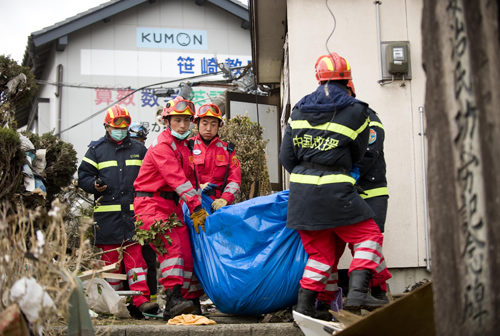|
 |
|
NEIGHBORLY HELP: CISAR members assist with rescue efforts in Ofunato City, Iwate Prefecture in Japan, on March 15 (LU XIAOWEI) |
A video clip on Liu Xiangyang's computer displays a moment he is very proud of. The clip shows an Iranian boy running after some vehicles, holding China's national flag in his hands and chanting "China, China…"
The vehicles carried members of the China International Search and Rescue Team (CISAR). Liu, the CISAR's deputy chief, recorded the video on December 31, 2003, when the CISAR left Iran after completing a search and rescue mission.
"The CISAR is an envoy of peace, humanism and internationalism. I feel every mission is sacred," said Liu, who has been on several overseas rescue missions.
The CISAR's most recent mission was to Japan, where the team participated in rescue work after the devastating earthquake and tsunami that struck the country in March. Team members carried out rescue work in the face of powerful aftershocks and radiation leaks.
Quick response
The CISAR, whose mission is to search for and rescue survivors buried in collapsed structures during disasters such as earthquakes, was established in 2001. It has participated in 16 rescue missions at home and abroad. On May 21, 2003, it made its first overseas mission to Algeria, which was jolted by a powerful earthquake.
The team, with Liu as its head, arrived in Algeria after a 14-hour flight. A UN disaster relief coordinator praised the CISAR's reaction as "incredibly swift." Team members quickly located and pulled a survivor from the debris. Among the 38 international research and rescue teams that responded to the Algerian quake, only the CISAR and a French team extracted survivors.
On October 8, 2005, the CISAR, once again led by Liu, was the first rescue mission team to arrive at the scene of a 7.6-magnitude earthquake that struck north Pakistan. Because of its excellent track record and rapid response, the CISAR was assigned by the Office of UN Disaster Relief Coordinator to coordinate the operation.
"Coordinating the work of 44 international search and rescue teams operating in north Pakistan was both a challenge and an honor," Liu said. The CISAR's performance was highly commended by the UN and its foreign counterparts.
"Because of the distances involved in overseas operations, fast response is particularly valuable," said Chen Jianmin, Director of the China Earthquake Administration.
According to Chen, whenever an earthquake strikes a foreign country, the CISAR will immediately contact its government and relevant international organizations to see if assistance is needed.
To achieve the fastest possible response time is the CISAR's aim. Chen cited the CISAR's operation in Pakistan as an example. "From the moment the CISAR team began to assemble to the time they landed in Pakistan, it was no more than 24 hours," he said.
Strong minds
"To race against death and disaster, a strong mind is as important as a strong body," Liu said. "Some of the scenes we've witnessed have been so shocking that team members have difficulty sleeping and wake up with nightmares."
"Every CISAR member goes through intensive physical and psychological screening before coming on board, but everyone needs additional training to cope with the stress," Liu said.
"The best training, however, is real-life rescue experience," said Lu Jie, a retired CISAR member and seasoned rescuer.
Now a coach at the National Earthquake Relief Training Center, he said every team member went through a psychological process, from initial excitement to panic and grief and then to eventual composure."
"New team members are often too nervous and excited to sleep before their first mission. But they soon learn it is important to conserve their energy on the way to the disaster region, so that they can be efficient on the scene," Lu said.
| 